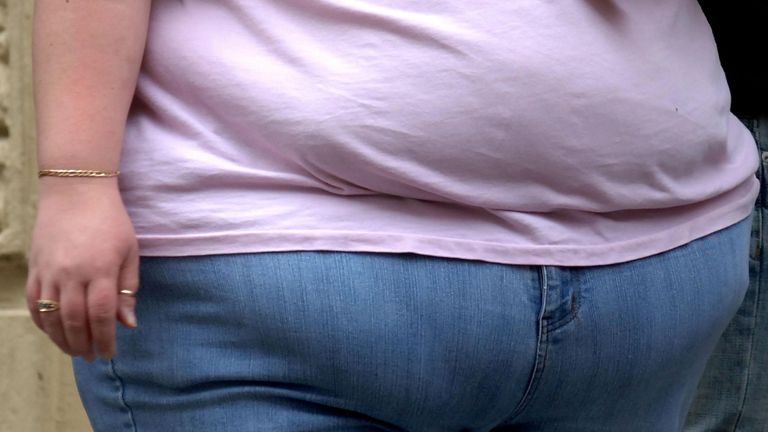Obesity plans are nothing new - but this time people might listen because of COVID
You are 40% more likely to die of coronavirus if you are overweight or obese, Public Health England figures show.
Tuesday 28 July 2020 08:25, UK
The prime minister has unveiled a new government strategy to tackle obesity - that looks a lot like previous attempts to make us lose weight - but this one might work.
The main reason is because Boris Johnson nearly died from COVID-19.
And the prime minister knows his chances of recovery were greatly reduced because, by his own definition, when he went into ICU he was "way overweight".
In a tweet posted by Downing Street, Mr Johnson tells us his new fitness regime, which includes walking his dog first thing in the morning, has seen him lose more than a stone.
The prime minister has been so scared by his near-death experience that he is making lifestyle changes that will give him a better chance of survival if there is a second wave of coronavirus.
And he is trying to make us do the same.
As part of this government "Better Health" strategy there will be calories printed on menus in restaurants to help us make "healthy choices".
These counters might even extend to the alcoholic drinks we buy to accompany our meals, which highlight so-called "invisible calories".
Junk food adverts will be banned from our screens and online before 9pm and supermarkets will no longer be able to promote buy one get one free offers on unhealthy snacks.
All this runs against everything a libertarian prime minister believes in. Boris Johnson is against what he calls the nanny state. People, he thinks, should be free to make their own choices.
He was the one who opposed the milkshake tax for that same reason. Why then the change of heart?
It is because the evidence shows people who are obese are more likely to die or become very sick from COVID-19.
According to a Public Health England (PHE) report published recently that figure is 40%.
Almost a third of all adults in England are classified as clinically obese. The figure is even higher if you include overweight adults.
It is one reason why some experts think the UK was so badly hit by the virus.
Months of lockdown isolation have only added extra inches to our waistlines. The lack of exercise, especially for children, will have taken its toll.
But this "new strategy" is not very new. There have been similar attempts to hide high fat, sugary and salty foods before.
Some doctors, experts in obesity, are already writing off this initiative saying it does not address the immediate problem with an obese population.
Dr Zaher Toumi, a bariatric surgeon, said: "It doesn't give any proper evidence-based solution to people who are already affected by the condition.
"We have 12 million adults in the UK who are affected by obesity and most of these people will require proper treatment.
"The government must recognise the complexity of the disease to find the right solutions.
"We don't want headline grabbing solutions. We want solutions that are beneficial for those affected by obesity.
"I see obese people on a daily basis who have tried almost all of their lives using the strategies not very different to the government strategies announced today.
"They've been on every diet under the sun and they didn't succeed. If they did, and that's a minority, they put the weight back on.
"We need a strategy which recognises what the evidence tells us about obesity and treats it appropriately."
This time though the outcome might be different.
Dieting, exercise and weight loss are still seen by many as lifestyle choices.
But after living through pandemic that has claimed so many lives, many people, like the prime minister, might think they want to improve their chances of living through the next wave, if there is one.
Natasha Thompson, a former carer from Ealing, west London is unemployed and claims Universal Credit.
:: Listen to the Daily podcast on , , ,
She said her shopping basket is only filled with things she can afford and not with food that have any health benefits or nutritional value.
"It is difficult walking around with a list," she said.
"And then you think I'd like that but you can't have it because of the budget."
She says she is angry with the government, adding: "It's fine for them on their wages but you need to pay for a gym. I don't have £50 at the end of the month to put into a gym."
And that is the stark reality for many low income families. The new government plans make no mention of how to help these people.
It is another health inequality exposed by COVID-19.
But Natasha did say the lockdown had emptied the roads and that she has saved up for a second-hand bike to start cycling again.
She has not seen the prime minister's tweet but somehow she has made the connection between obesity and the virus.
And that might make more of a difference to her than any BOGOF offer.









